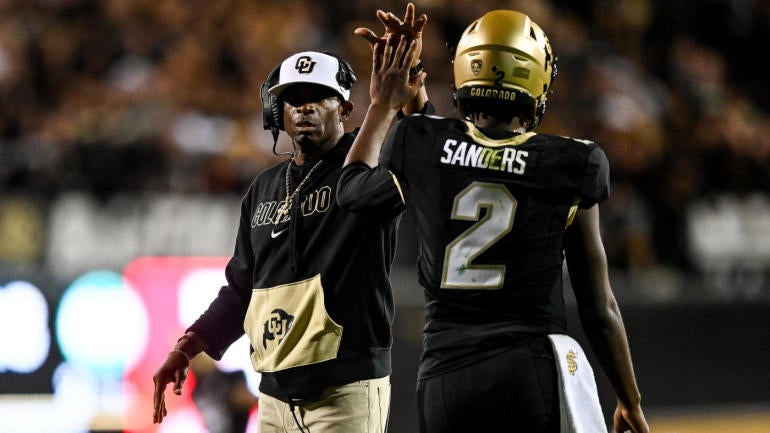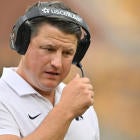
Big expectations follow Deion Sanders like a shadow. Few are more adept than the Colorado coach at building hype and energy around his program, no matter what the circumstances may be. His first season in Boulder certainly gave fans a glimpse of what could be on the horizon.
Colorado started the 2023 season scorching hot; a debut win over TCU kick-started a 3-0 run that culminated in an appearance in the AP Top 25. Then the wheels fell off against eventual Pac-12 runner-up Oregon, and Colorado only won one of its last nine games to drop to 4-8.
That's not necessarily a disappointment. Colorado hasn't won more than four games since 2019. Its streak without a winning record extends far beyond that back to 2016. Given the program's context, Sanders' first year was a success.
Now he's gearing up for more. Sanders spent the offseason reworking his coaching staff with shuffles at both offensive and defensive coordinator. Once again, he hit the transfer portal in an effort to revamp his roster, supplementing returning stars like quarterback Shedeur Sanders and two-way unicorn Travis Hunter. In total, 24 transfers will suit up for the Buffaloes in 2024.
But did Sanders do enough to make significant strides forward? It will all come down to a couple of key areas that absolutely had to be addressed.
Offensive line overhaul
Anyone who watched Colorado for more than a quarter last season noticed one glaring error: its offensive line was simply not up to standard. It was so far below standard, in fact, that it edged out just one FBS team when it comes to sacks allowed. Opponents got to Colorado's quarterbacks a total of 56 times, more than any other team at the power-conference level.
Quarterback Shedeur Sanders was the second-most sacked signal-caller among power-conference school and hit so often that he missed the final game of the season with a fracture in his back. Colorado's offensive line wasn't just a turnstile in the passing game -- its deficiencies severely hampered the team's rushing efforts, too. The Buffaloes finished dead last in the Pac-12 with 68.9 rushing yards per game and were one of just eight FBS teams to finish the year with fewer than three yards per carry.
Most of Colorado's starting offensive linemen could have returned for another year of eligibility. Sanders saw enough. He made the trenches priority No. 1 in the transfer portal and came through with five new additions in that regard during the winter window.
All five of Colorado's new transfer offensive linemen have starting experience and might just mesh immediately to form CU's frontline moving forward.
- Phillip Houston: Started 12 games at right tackle for FIU in 2023.
- Justin Mayers: Started at offensive guard for UTEP in each of the last two seasons, has the potential to play on either side of the ball.
- Yakiri Walker: Coming in at a rather diminutive 6-foot-2 and 270 pounds, Walker is a pure center with more than enough athleticism to make up for his lack of stature.
- Tyler Johnson: A four-star prospect in 247Sports' transfer rankings, Johnson spent two years as a starting right guard at Houston.
- Kahlil Benson: Though he started at right guard for Indiana over the past couple of years, Benson is a better pass blocker with a skillset and 6-foot-6 frame that could find a home at tackle.
On top of all of that, Colorado made a splash during the early high school signing period by securing five-star offensive line prospect Jordan Seaton, beating out powerhouse programs like Oregon and Alabama in the process. Seaton, who could play outside or in the interior at the collegiate level, is the No. 13 prospect nationally and No. 1 inside offensive lineman in the Class of 2024, according to 247Sports. Worst-case scenario, he'll get a year to develop behind some of Colorado's experienced transfers, but it wouldn't be surprising if he sees the field.
From a coaching perspective, Sanders replaced departing offensive line mentor Bill O'Boyle with a young and largely unproven option in Phil Loadholt. The former NFL offensive tackle has yet to hold an assistant coaching spot at any level and has spent the last six years as an offensive analyst with the likes of Ole Miss and Oklahoma. His lack of experience is a concern but he should be able to confer some of that firsthand NFL wisdom in a teaching role.
So, did Colorado do enough to improve its offensive line? It's almost a miracle that Colorado won four games with the state of its offensive line last season, and the bar for improvement is buried deep beneath Folsom Field. With that in mind, incremental progress may be enough to propel Sanders' squad towards some sort of postseason berth.
Push for more defensive improvement
Though Colorado's defense drew a lot of deserved flak last season, the Buffaloes actually looked a lot better than they did in the year before Sanders' arrival. Their per-game totals in points allowed, total yards allowed and rushing yards allowed all improved. The Buffs finished with three times as many sacks (from nine to 27) from 2022 and an almost doubled turnover total (from 11 to 20).
That said, Colorado's defense was still poor. Allowing just over 35 points per game is better than 40-plus, but it's still well below the national average. Despite a talent-laden room and Sanders' own past as a player, Colorado's secondary got shredded for 296.6 yards per game.
New defensive coordinator Robert Livingston should help in that regard. Stepping in for the departing Charles Kelly, Livingston joins Sanders' staff after six years as safeties coach with the Cincinnati Bengals. Though his responsibilities as a coordinator extend beyond Colorado's defensive backfield, he'll surely work closely with a young crop of talent.
None of the names are bigger than Hunter, who is equally talented at cornerback and wide receiver. Across from him Colorado has former five-star corner Cormani McClain, who didn't play a huge role as a freshman but will be relied upon to take a leap entering his second collegiate season. Veteran safety Shilo Sanders is back as a steady presence and four-star Liberty transfer Preston Hodge will push to start.
Further aiding the defense is a pass rush that should continue to take steps after loading up on defensive line talent via the transfer portal. Former Arizona State edge B.J. Green had six sacks and 11.5 tackles for loss last season. He's one of three four-star additions in the defensive trenches, joined by fellow transfers Samuel Okunlola (Pittsburgh) and Quency Wiggins (LSU).
A look ahead
What does improvement even look like for Sanders' Colorado? He inherited a complete mess and put an admirable four-win effort on the board in his first year. He doesn't necessarily need to make a bowl to show signs of progress, especially as the program embarks on a new journey in the Big 12.
Get to at least five wins while staying competitive in most conference games and folks will surely be satisfied. But, without letting the hype train get too far off the rails, the 2024 schedule does set up well for Colorado to make it back to the postseason for the first time since 2020.
Interestingly enough, Colorado's opener against FCS powerhouse North Dakota State will be a good litmus test. The Bison aren't your typical schedule fodder; they've won six out of their last seven games against FBS opponents, including an upset against No. 13 Iowa in 2016. A multi-score win against NDSU would be legitimately impressive.
The rest of the nonconference slate is rather manageable. Colorado has to play Nebraska on the road, which could be the first start against power-conference competition for new Cornhuskers quarterback Dylan Raiola. After that is another road tilt against in-state rival Colorado State, a team that came close to upsetting Colorado last season. Again, a more comfortable win would be evidence of improvement.
Win those three, which is perfectly doable, and Colorado would need just three wins in Big 12 play. That kicks off with a home game against a Baylor team fresh off a 3-9 season. The Bears are one of three Big 12 opponents on Colorado's schedule that finished below .500 in conference play last season, joined by UCF and Cincinnati.
Sanders was proactive and dealt with most major areas of need after his first year in Boulder. Time will tell if it was enough to reach the lofty goals that he's set out for himself, but it's not unrealistic to expect some sort of Year 2 leap from the Buffaloes.





















